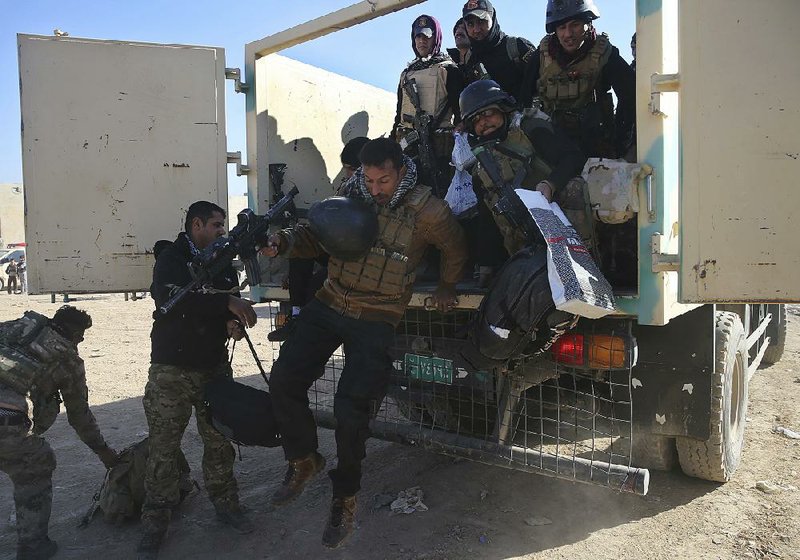MOSUL, Iraq -- An airstrike by the U.S.-led coalition on Wednesday "disabled" a fourth bridge across the Tigris River in Mosul, leaving only one intact crossing in the northern Iraqi city and further disrupting the Islamic State extremist group's supply lines.
The Islamic State-run Aamaq news agency and an Iraqi military commander in Mosul reported the pre-dawn airstrike, the second to target a bridge this week. Two other bridges were destroyed by airstrikes last month.
The airstrike was followed by intense fighting in an eastern Mosul neighborhood where Iraq's special forces are slowly advancing toward the city center, hampered by suicide car bombings, snipers and concern over the safety of civilians.
The Tigris River runs through the center of Mosul, and until now most of the fighting has been on the eastern bank. Iraqi forces are expected to use pontoon bridges when they reach the river.
Brig. Gen. Haider Fadhil of the Iraqi special forces said his men were slowly pushing back Islamic State fighters in the densely populated Zohour neighborhood, where several suicide car bombs were destroyed by airstrikes before reaching their targets.
"We have cut off Tal Afar from Mosul and we cut off Mosul from Syria," said Jaafar al-Husseini, a spokesman for the Hezbollah Brigades.
Dozens of families fled their homes, as drones buzzed overhead and airstrikes echoed across the city, sending plumes of smoke into the air. Some residents carried their belongings in plastic bags, with one family arriving on a donkey cart.
The tide of displaced people reached the Samah district, where Iraqi medics treated dozens of wounded, including at least six soldiers.
A man and his four children were helped to a nearby medical station. All five were bleeding from shrapnel wounds after a mortar round struck their home. Dozens more tried to reach the aid station but were held back by troops, who said they had intelligence that the Islamic State, also known as ISIS, was sending suicide bombers disguised as civilians.
Then the main rush came -- hundreds of civilians racing forward on a dirt road. The troops ordered them to halt. One of the men raised his shirt to show that he wasn't armed, saying he was desperate for food.
Iraqi troops later arrived from the front lines with a man who was bound and hooded. They said they had caught him setting tires on fire to help shield the militants from view. Trembling, the man said he had been forced to aid the extremists.
Mosul, which fell to the Islamic State in the summer of 2014, is still home to more than 1 million people. Fearing a mass exodus, authorities have urged residents to stay inside their homes. But the presence of civilians has prevented the U.S.-backed Iraqi forces from using overwhelming force, slowing their advance.
The U.N. says at least 68,000 people have fled the fighting in Mosul, including 8,300 over the past four days. The majority of the displaced -- 59,200 -- came from districts outside the city.
Black Humvees carried wounded soldiers back from the front. The body of a special forces soldier killed in combat was wrapped in a blanket on the hood of a vehicle. The Iraqi military does not release official casualty figures, but field medics say dozens of troops have been killed and wounded since the Mosul operation began last month.
Mortar rounds, artillery and gunfire rang out throughout the day, punctuated by occasional booms from airstrikes that sent plumes of smoke into the air.
Elsewhere in Iraq, seven separate attacks in and around the capital, Baghdad, killed at least 14 people and wounded 47, according to police and health officials, who spoke on condition of anonymity because they were not authorized to brief reporters.
The Islamic State still regularly targets the capital despite suffering a series of battlefield losses elsewhere in the country over the past year.
Information for this article was contributed by Bassem Mroue and Sinan Salaheddin of The Associated Press.
A Section on 11/24/2016


